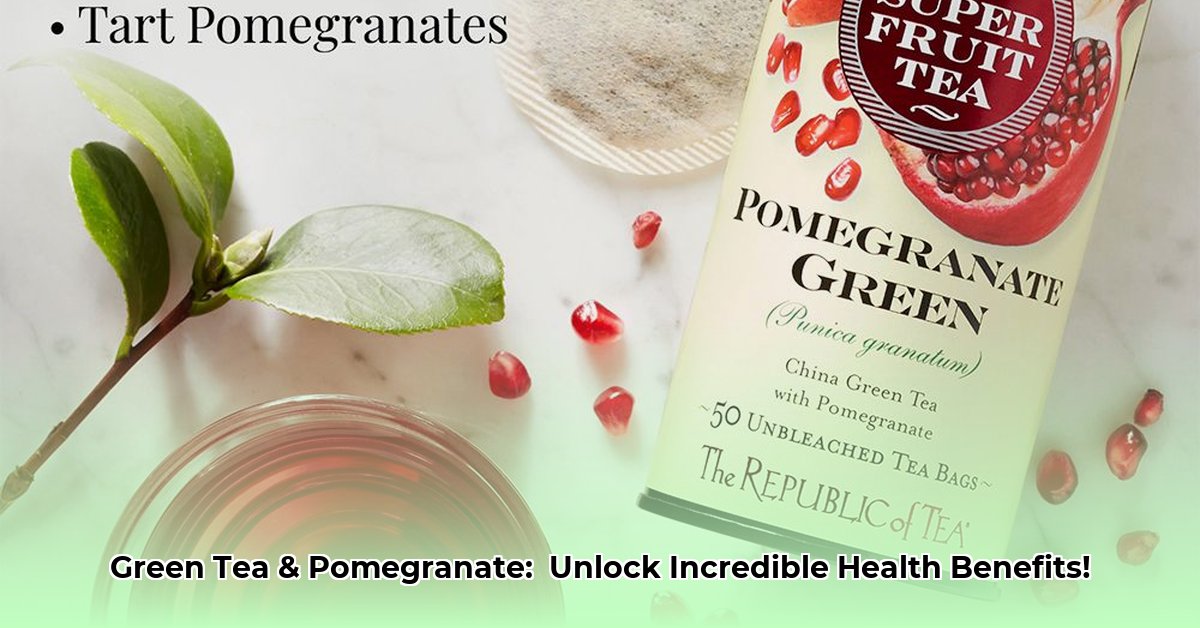
So, you're intrigued by the health benefits of green tea and pomegranate juice? Both beverages boast impressive nutritional profiles, but which one best suits your needs? This comparative analysis will explore their unique strengths and highlight key considerations for making an informed choice.
Antioxidant Powerhouses: A Detailed Comparison
Both green tea and pomegranate juice are rich in antioxidants, those microscopic warriors that combat free radicals (unstable molecules that damage cells and contribute to aging and disease). Green tea's potent antioxidant arsenal includes catechins, particularly epigallocatechin gallate (EGCG), known for its anti-inflammatory properties. Pomegranate juice, on the other hand, boasts ellagic acid and punicalagins, different types of antioxidants offering similar benefits. While both provide significant antioxidant support, their mechanisms of action differ.
"Think of antioxidants as tiny superheroes fighting off those nasty free radicals in your body," explains Dr. Anya Sharma, a registered dietitian at the University of California, San Francisco. "Both green tea and pomegranate juice offer a substantial boost, though their specific antioxidant profiles vary."
Beyond Antioxidants: Exploring Additional Benefits
The advantages extend beyond antioxidant action. Green tea's caffeine content can provide a gentle energy boost and potentially enhance cognitive function. Some studies even suggest a link to improved metabolism and weight management, although more extensive research is needed to confirm these findings conclusively. Meanwhile, pomegranate juice has garnered attention for its potential role in prostate health, possibly due to its unique antioxidant blend. "While promising, it’s crucial to remember that these potential benefits are not guaranteed and further research is needed to confirm these effects," adds Dr. Sharma. The effects may depend heavily on individual factors and lifestyle choices.
Key Differences: Caffeine and Potential Drug Interactions
A significant difference lies in caffeine content. Green tea contains caffeine, which can energize some individuals while causing anxiety or sleep disturbances in others. Pomegranate juice is naturally caffeine-free, offering a stimulant-free option. "Caffeine sensitivity varies widely among individuals," notes Dr. David Lee, MD, a specialist in internal medicine at Stanford Health Care. "Those sensitive to caffeine should opt for pomegranate juice." Another consideration is potential medication interactions. Pomegranate juice, in particular, might have interactions with certain medications; always consult your doctor or pharmacist before adding it to your diet if you're on prescription drugs.
Integrating These Drinks into a Healthy Lifestyle
It's important to emphasize that neither green tea nor pomegranate juice is a magic bullet. They should be seen as complementary components of a holistic health regimen that includes a balanced diet, regular exercise, and stress management techniques. "These drinks can be valuable additions to a healthy lifestyle, but they shouldn't replace a well-rounded approach," counsels Dr. Lee.
Green Tea vs. Pomegranate Juice: A Side-by-Side Comparison
The following table provides a concise summary of the key features of each beverage:
| Feature | Green Tea | Pomegranate Juice |
|---|---|---|
| Primary Antioxidants | Catechins (especially EGCG) | Ellagic acid, Punicalagins |
| Caffeine | Present | Absent |
| Cognitive Function | Potential enhancement | Limited effect |
| Cardiovascular Health | Potential benefits | Potential benefits |
| Prostate Health | Limited evidence | Potential benefits |
| Weight Management | Potential aid (requires further study) | Limited scientific support |
| Medication Interactions | Generally low | Potential interactions |
How to Choose: A Personalized Approach
The optimal choice depends entirely on individual needs and preferences. Factors to consider include caffeine tolerance, existing health conditions, and medications. If you require a cognitive boost, green tea might be more suitable. If maximizing antioxidant intake is your priority, the evidence suggests pomegranate juice could be a superior option. But remember, "a diverse diet is key," emphasizes Dr. Sharma. Including both could provide a range of benefits. Always consult your healthcare provider before making significant dietary changes.
Key Takeaways: Putting it All Together
- Antioxidant Power: Pomegranate juice demonstrates higher antioxidant capacity in vitro, suggesting potentially stronger free radical scavenging. However, in-vivo human studies are needed for definitive comparisons.
- Cognitive Function: Green tea's L-theanine content uniquely promotes relaxation and focus, a benefit absent in pomegranate juice.
- Broad Health Benefits: Both beverages offer antioxidant benefits, potentially supporting cardiovascular health and reducing inflammation. They also contain essential vitamins and nutrients.
- Further Research: Additional research, focusing on long-term effects and bioavailability of antioxidants, is crucial for a complete comprehension of their health impacts.
Making an Informed Decision: A Step-by-Step Guide
- Assess your goals: What are you hoping to achieve—increased energy, enhanced focus, boosted antioxidant protection?
- Consider your sensitivities: Are you sensitive to caffeine or prone to digestive upset?
- Embrace dietary diversity: Instead of choosing one over the other, consider incorporating both green tea and pomegranate juice into your diet for a wider array of benefits.
- Consult a professional: Discuss these beverages with your doctor or registered dietitian, particularly if you have pre-existing health conditions or are taking medications.